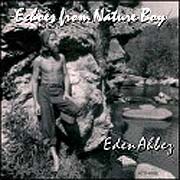Home · Listener's Guide · The Songs · Who's Who · Liner Notes · Selected Tracks · What's New · Search

Eden Ahbez
- Born Alexander Aberle, 15 April 1908, Brooklyn, New York
- Died 4 March 1995, Los Angeles, California
Eden Ahbez was one of the authentic fringe figures in space age pop, a one-shot wonder so dramatically different from anyone else that he became, perhaps, a greater legend than his accomplishments justify. Born a good Jewish boy in Brooklyn, he ended up cultivating a Christ-like appearance and reputation among the fruits and nuts of sunny southern California.
 Just what brought him from Brooklyn in 1908 to Los Angeles in the mid-1940s awaits a better biographer's investigation. He claimed to have been raised in an orphanage, and have crossed the U.S. on foot eight times by the age of 35. He settled in L.A., married a woman named Anna Jacobsen, slept with her in a sleeping bag in Griffith Park, claimed to survive as a vegetarian on three dollars a week, and stood on street corners in Hollywood lecturing on various Oriental forms of mysticism.
Just what brought him from Brooklyn in 1908 to Los Angeles in the mid-1940s awaits a better biographer's investigation. He claimed to have been raised in an orphanage, and have crossed the U.S. on foot eight times by the age of 35. He settled in L.A., married a woman named Anna Jacobsen, slept with her in a sleeping bag in Griffith Park, claimed to survive as a vegetarian on three dollars a week, and stood on street corners in Hollywood lecturing on various Oriental forms of mysticism.
He emerged to public attention around 1948, when Nat King Cole recorded his song, "Nature Boy," that told a fantasy of a "strange enchanted boy" "who wandered very far" only to learn that "the greatest gift" "was just to love and be loved in return." Having no job and no fixed residence, he had plenty of time to hang around places like the Lincoln Theater, where he accosted Cole's manager, Mort Ruby, insisting that Cole look at the soiled, rolled-up manuscript of "Nature Boy."
Cole recognized the underlying Yiddish melody in the song (as did the publishers of the Yiddish song, "Schwieg Mein Hertz," who later settled out of court with Ahbez after the tune became a hit) and expressed mild interest in adding it to his repertoire, since he was looking for a Jewish song to add to his act. After trying it a few times in his show, he decided to record it, with Frank DeVol provided the arrangement. He and DeVol tossed out the original waltz melody and went rubato, without a set rhythm, and recorded it on 22 August 1947. Buddy Cole played the piano part Nat had written.
Cole and Capitol didn't know what to make of the song, so they sat on the record for months. Meanwhile, word-of-mouth about the tune began to grow from Cole's live performances, and eventually Cole realized the record should be released. Unfortunately, no one had bothered to secure the rights to the song, and Ruby went off on a hunt to locate Ahbez. Legend has it that he found Ahbez and his wife camped out below the first "L" in the "HOLLYWOOD" sign. It turned out that Ahbez had given a half dozen people different shares of the publishing rights, and he ended up with virtually nothing. (After Cole died, his wife eventually gave the rights in toto back to Ahbez.)
Capitol released the tune as a "B" side, but when it first played on WNEW in New York, the station was bombarded by calls, and "Nature Boy" quickly became Capitol's #1 single. Frank Sinatra, Dick Haymes, Sarah Vaughan, and others rushed out cover versions, with the Petrillo recording ban looming just days away.
Ahbez was a legend in Hollywood for his unusual life style. Even after he and Jacobsen had a son, they kept on living out under the stars, with not much more than a bicycle, their sleeping bags, and a juicer to their name. The story may be apochryphal, but it's said that once, when Ahbez was being hassled by a cop who assumed from his wild appearance that he deserved to be hauled off to a mental institution, he remarked calmly, "I look crazy, but I'm not. And the funny thing is, that other people don't look crazy, but they are." The cop thought it over and responded, "You know bud, you're right. If anybody gives you any trouble, let me know."
Although Ahbez (or "ahbez," as he insisted in being called, holding that capital letters should be reserved for the divine) later had another tune, "Land of Love," recorded by Cole, he faded back onto the street corners until 1960, when Del-Fi Records boss Bob Keane brought him into the studio to record Eden's Island. For this album, Ahbez recited his poetry/songs in front of a pseudo-Martin Denny jungle exotica arrangement. Mickey McGowan has described this album as sounding like "Martin Denny had gotten together with Jack Kerouac" (if Kerouac had become a hermit instead of a beat, that is).
Ahbez popped up in a few different places during the 1960s, most prominently with Brian Wilson somewhere in the days before the legendary Pet Sounds and Smile albums were recorded. He cut another album, Echoes from Nature Boy, similar to Eden's Island, putting his poems in musical settings, which was released posthumously. Ironically, he died in 1995 after being hit by a car.
Recordings
- Eden's Island, Del Fi LP
- Echoes from Nature Boy, Accent Records
S p a c e A g e P o p M u s i c
Home · Listener's Guide · The Songs · Who's Who · Liner Notes · Selected Tracks · What's New · Search
Email: editor@spaceagepop.com